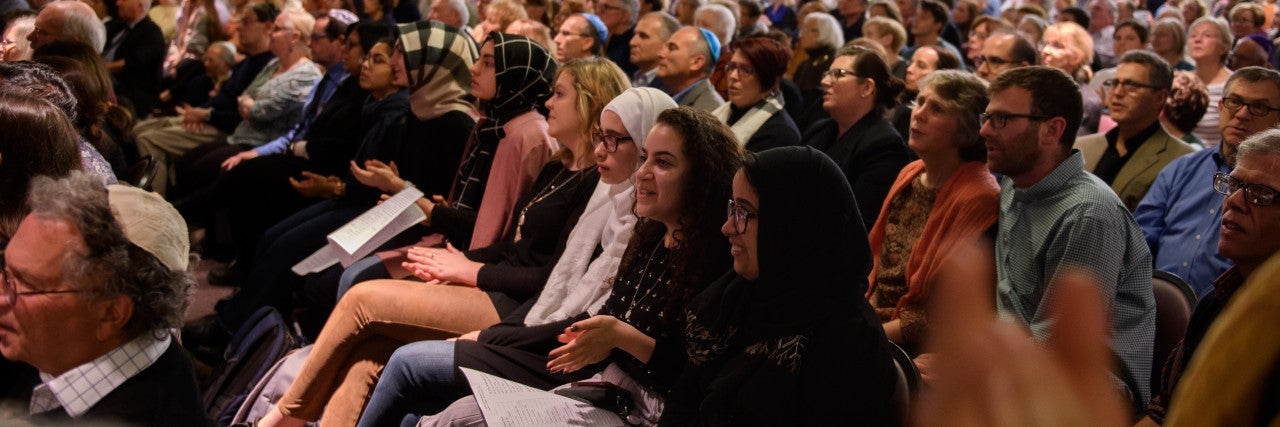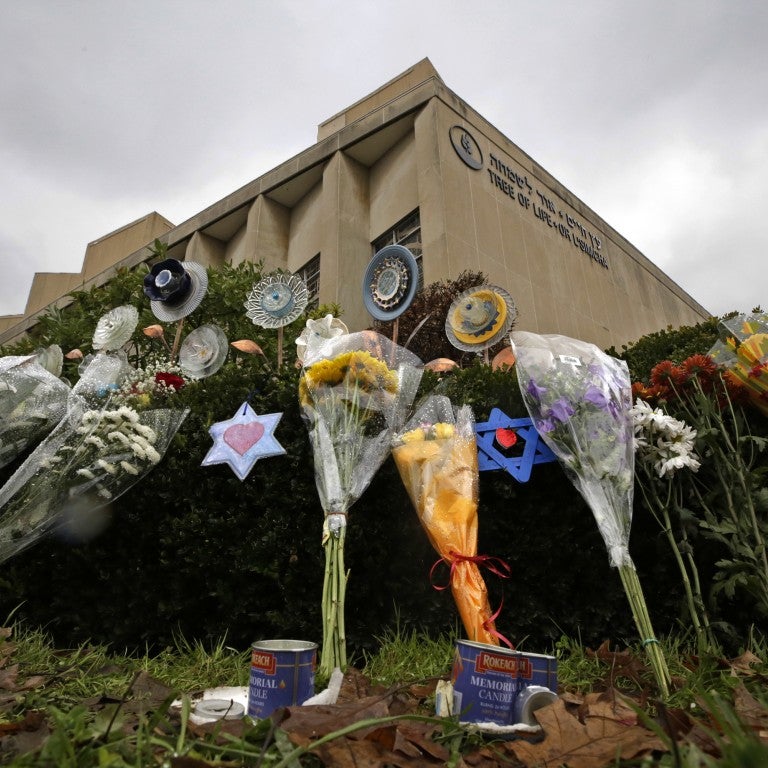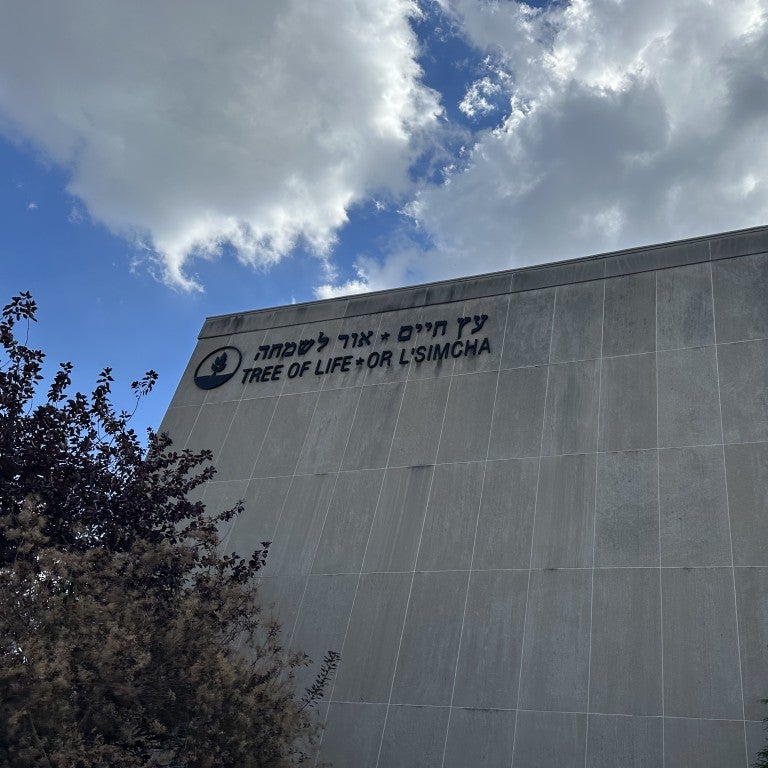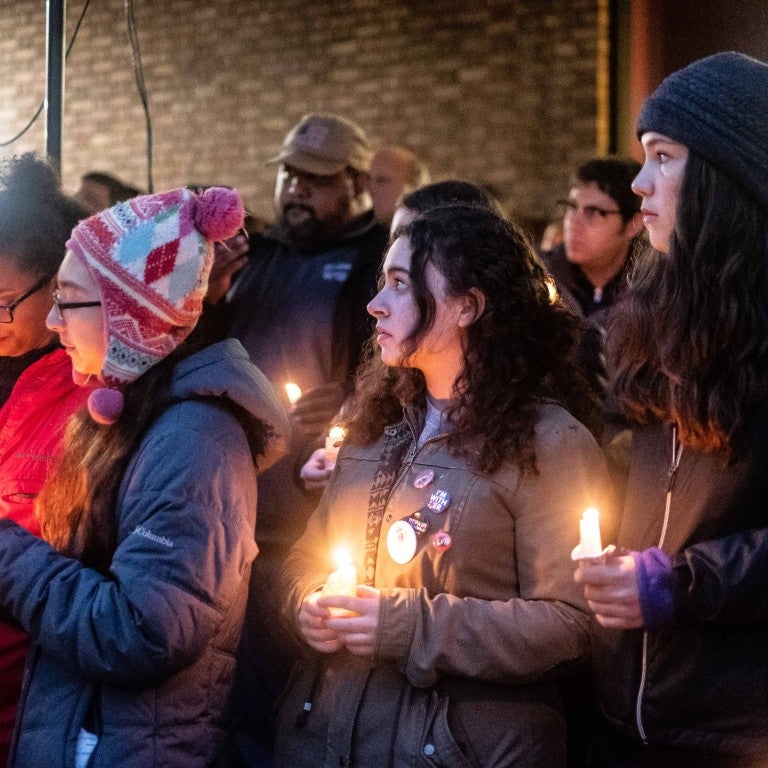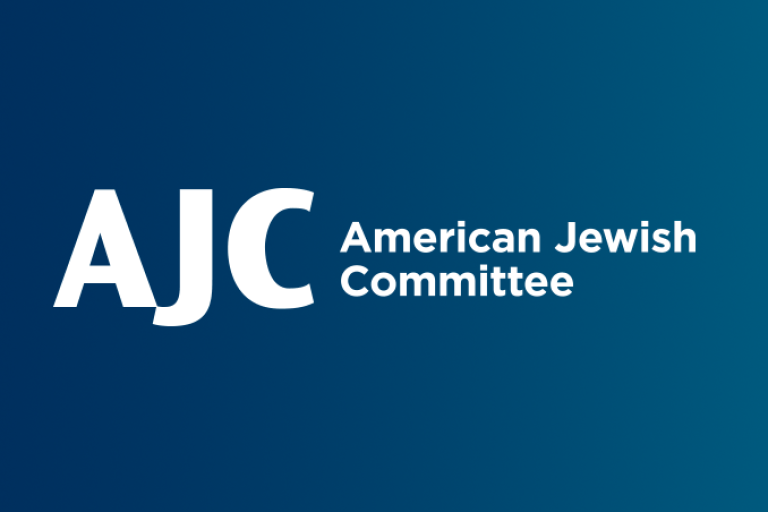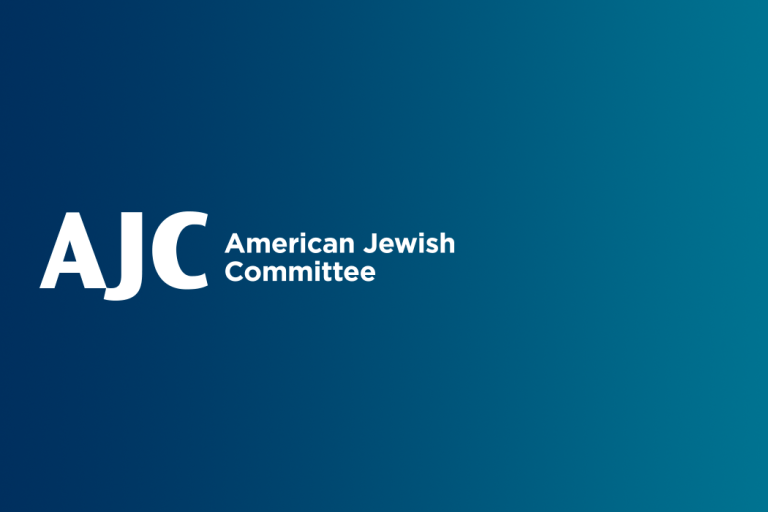October 26, 2023
In the aftermath of the slaughter of 11 Jews inside the Tree of Life Synagogue in Pittsburgh, the deadliest antisemitic attack in U.S. history, American Jewish Committee (AJC) drew up a plan to galvanize Jewish communities and their allies across the world in an expression of unity and defiance: #ShowUpForShabbat. The campaign, which reached hundreds of millions of people, urged those of all faiths to attend synagogue services during the Shabbat following the attack to show solidarity with the Jewish community.
In this third episode of our Remembering Pittsburgh series, hear from some of those who showed up to that Shabbat five years ago on what the experience meant to them and how the events of that week altered their perspective on antisemitism in America.
*The views and opinions expressed by guests do not necessarily reflect the views or position of AJC.
Episode Lineup:
- (0:40) Belle Yoeli, Anne Jolly, Rachel Ain, Sharif Street, Jennifer Mendelsohn
Show Notes:
Listen:
- Remembering Pittsburgh Part 1: Behind the Scenes at the Reimagined Tree of Life
- Remembering Pittsburgh Part 2: What the Family of Tree of Life Victim Joyce Fienberg Wants You to Know About Her Legacy
Take Action:
Music credits:
- Shloime Balsam - Lo Lefached
Follow People of the Pod on your favorite podcast app, and learn more at AJC.org/PeopleofthePod
You can reach us at: peopleofthepod@ajc.org
If you’ve appreciated this episode, please be sure to tell your friends, and review us on Apple Podcasts.
Episode Transcript:
Manya Brachear Pashman:
This month, AJC set out to mark the five-year anniversary of the Pittsburgh Synagogue Shooting at the Tree of Life with a series of episodes exploring this turning point for the American Jewish community. Our first installment aired October 5. Two days later, the Jewish people faced another unprecedented deadly antisemitic attack, this time in Israel. Synagogues stepped up security and families tamped down their fears to take their children to Hebrew school or attend Shabbat services. In the second episode of our series, we sat down with Howard and Marnie Fienberg, who paid tribute to their mother Joyce. In this third installment, we look back at how horror drew people to solidarity. May we see that same solidarity today.
Belle Yoeli: We saw hundreds of thousands of people show up. And we saw pictures later, after the fact, and videos, and people making speeches, and just so much solidarity. This was captured on the news. I think it really stands out as one of the most amazing responses to antisemitism that we've seen in modern history.
Manya Brachear Pashman: On October 27, 2018, Americans witnessed the deadliest antisemitic attack in this nation’s history. Eleven worshipers inside the Tree of Life Synagogue in Pittsburgh were murdered just for being Jewish. The senseless slaughter inside a house of worship devastated and shocked American senses because it was simply unAmerican. But the aftermath of the atrocity became an American moment when so many people showed up – showed up with hugs, showed up with flowers, showed up with prayers for their Jewish neighbors.
The most visible expression of this came a week after the massacre with the unprecedented turnout of people of all faiths at synagogues across the nation as part of AJC’s #ShowUpForShabbat campaign. Together, Americans sent a message that hate will not prevail.
Belle Yoeli: Everyone wanted to do something, and the entire Jewish community mobilized to make this happen with the understanding that as AJC has always said that antisemitism is not just about the Jewish community. It starts with the Jewish community, but it's a threat to democracy, and the murder of Jews in their religious institution is such a breaking, a fracturing of everything that the United States stands for, everything that democratic society stands for.
Manya Brachear Pashman: Today, Belle Yoeli is the chief advocacy officer for AJC. In 2018, she worked as the chief of staff for then AJC CEO David Harris. David had spent nearly 20 years counseling European leaders on the rise of antisemitism in their midst, calling their attention to violent crimes against Jews when conflict erupted between Israel and their Arab neighbors.
Belle was on her way to a nephew’s birthday party when she got the call on October 27 about what had happened in Pittsburgh. She remembers sobbing in the car on the phone with colleagues as they all grappled with the reality that whether they were regular shul-goers or had just happened to go to synagogue to celebrate a friend’s bar mitzvah that day – it just as easily could’ve been them. For many, what they needed now was to go to shul and not be afraid, and to see others, not just their own community, but others of all faiths in the pews alongside them. What they needed most now was to know they were not alone. So they drew up a plan.
Belle Yoeli: A couple members of our staff actually kind of simultaneously came up with a similar idea, which was that we need to, more than anything, rally non-Jews to come and support the Jewish community at this time, and what better time to do that than the following Shabbat.
Manya Brachear Pashman: Dubbed #ShowUpForShabbat, the social media-based campaign called on both Jews and those of other faiths to flock to synagogues that coming Shabbat on the weekend of November 2 in support of the Pittsburgh Jewish community and all of American Jewry. The response across 80 countries was astounding.
More than 250 million people spread the message on social media, including celebrities Andy Cohen, Itzhak Perlman, and Mayim Bialik, and politicians Paul Ryan, Kamala Harris, and Sadiq Kahn.
And hundreds of synagogues across the country and around the world, from Tokyo to Santiago to London to San Francisco, welcomed people of all faiths into their sanctuaries. Those who walked through the doors included diplomats from dozens of countries, federal, state, and local elected officials, and Christian, Muslim, Hindu clergy. Synagogues across the country reported massive crowds rivaling or exceeding those seen at High Holy Day services.
Belle Yoeli: There are some times, I think before Pittsburgh, and before Tree of Life and after, where the Jewish community doesn't always feel like we are seen, and that we need defense too. When it comes to antisemitism, because Jews are viewed as white or for other reasons, or when it comes to us attacks against Israel, we don't feel like our partners are necessarily always there for us, although many are. Seeing with such clarity how people were showing up for the Jewish community, we all really needed that. And honestly, society needed that and to see that. That we will not let this stand.
I think it shook everyone to their core and not just the Jewish community. That's what struck a chord with people that could have been me, that could have been hatred towards African Americans, that could have been hatred towards the Muslim community. Every single community who has a piece of them, an identity that’s so strong resonated with that.
Manya Brachear Pashman: We connected with people who showed up that Shabbat five years ago, and asked them what the experience meant to them, whether the events of that week altered their perspective on antisemitism in America, or changed how they show support to their Jewish neighbors.
Anne Jolly: An important part of what we proclaim is love God, love your neighbor, change the world. And so we believe that means we show up for each other. We can't love each other without being present with each other. So we have to be together. You have to show up.
Manya Brachear Pashman: Episcopal Bishop of Ohio Anne Jolly was serving as the rector of St. Gregory Episcopal Church in Deerfield, Illinois in October 2018. A former hospital chaplain, she was sitting in her office when she heard the news break that Saturday morning. Her first call was to her friend and colleague Rabbi Karyn Kedar down the road at the Reform temple commonly known as Congregation BJBE. Rabbi Kedar had recently preached at St. Gregory and then-Pastor Jolly was scheduled to deliver the guest sermon at BJBE the following Friday night.
Anne Jolly: I called her and we talked and we prayed. And I said to Karyn, I think probably you need to preach on the Shabbat following the shooting at your temple and she said, ‘I want you to do it.’ She said ‘I think I think we need to hear your voice and that the congregation needs to hear you.
Rabbi Kedar I think thought that to hear a voice of someone who is not Jewish saying aloud, We love you, we care for you. We believe we are all created in God's image together. And that means we need to show up for each other. It means we need to be present with each other, that to hear that from someone who was not part of their community might be more powerful, more impactful, and more important for the community here at that time.
Manya Brachear Pashman: When Bishop Jolly arrived that following Friday she did not expect her sudden sense of fear when she encountered armed guards.
Anne Jolly: I didn't realize I was afraid until I walked in the door. And I stopped and had to take a deep breath and realize that I was afraid because I was entering into a space of people who have long been afraid. And that I had never had to experience that before in that way. And I wasn't really afraid for my congregation the same way I was for my beloveds in the synagogue, that they had more of a reason to be afraid than I did. And that was all the more reason for me to be there, and to be present with them.
Manya Brachear Pashman: Bishop Jolly credits that night at BJBE for the deep connection that formed with the congregation. In fact, she returned to BJBE many more times to celebrate Shabbat. Precisely a year later, the members of the Jewish congregation showed up at her door after a pumpkin patch at St. Gregory had been destroyed by vandals.
Anne Jolly: There were a bunch of them that came to our patch and we were talking about it and they said, ‘We just wanted to show you that we are supporting you. And they were worried that that vandalism had been an act of aggression against us. And I just thought it was kids. And that was a really clear distinction of how our worldviews are different. For them, a vandalism thing would, of course, of course, be something hateful against them. In this case, it was children, it was just teenagers being dumb. But it reinforced that understanding that for them, fear is always in the background because of the violence perpetrated to them – again and again and again.
Rabbi Rachel Ain: It was not a wake-up call that hate existed and already the hate was being felt. And at the same time, the love with my neighbors was being felt. So I was able to hold on to both emotions. But really, as I look back at these five years. Pittsburgh to Poway to Colleyville to Jersey City. I mean, I can sort of think back to all of these moments. It's here. And we need to both be proudly Jewish, and strongly protected.
Manya Brachear Pashman: For Rabbi Rachel Ain, the spiritual leader of Sutton Place Synagogue, a conservative synagogue in New York City, the massacre at Tree of Life was not her first encounter with antisemitism. She knew it was simmering. A year earlier, almost to the day, vandals had spray painted swastikas across the entrance of her synagogue on the East Side of Manhattan. She knew how powerful it had been to have members of the wider community come support the congregation after that incident. Whether to invite members of the community to #ShowUpForShabbat was never a question in her mind.
Rabbi Rachel Ain: It's not only that I felt supported by my neighbors, especially those that weren't Jewish. But more than anything, it was that so many of our congregation members who were not, let's say Shabbat regulars, felt the importance and the value of showing up for Shabbat and they knew that they had an address to come to both physically and spiritually to place their pain and their needs.
Manya Brachear Pashman: That same weekend marked the bar mitzvah celebration of a young man in the congregation. Rabbi Ain wrestled with how to balance the sadness and shock of the prior weekend with the joy and celebration of his milestone. And a few years later, that same young man and his brother stepped up to lead the synagogue’s Holocaust Remembrance event, in which teens interviewed the children of Holocaust survivors and shared the stories that have been passed down to them. She wonders if that moving show of solidarity when he was 13 and the formational years that followed had an impact.
Rabbi Rachel Ain: What I really keep thinking about is how some of our teenagers who at that point, were in sixth grade or seventh grade. And now here they are seniors in high school and freshmen in college, how their teen experience has been shaped by showing up for Shabbat and showing up for shul when bad things have happened. So what I've also tried to do is, how do we ensure that our young people's experiences aren't only about the challenges of being Jewish, but the joys of being Jewish?
Sharif Street: I just remember the massive amount of people that showed up and the diversity of the folks. I mean, I don't think I'd seen that many people show up for an evening Shabbat at Rodef Shalom in, well, maybe ever.”
Manya Brachear Pashman: Pennsylvania State Sen. Sharif Street had been in Pittsburgh the day before the shooting at the Tree of Life building. When he heard the news that Saturday morning, he scrambled to find out if his friends and colleagues were OK. He was not oblivious to hatred and its potential to lead to violence. His father had been active in the civil rights movement and Sen. Street had sponsored legislation to curb hate crimes, but he had hoped to get ahead of the trend. This seemed unfathomable.
Sharif Street: I didn't really contemplate that in the Commonwealth of Pennsylvania, it was within the realm of reasonable possibility that someone was gonna walk into a synagogue, and commit such a vicious, horrible act of hate. I didn't see that.”
I thought we had moved beyond that stage of antisemitism and bigotry. And I was reminded of what my friends, older folks, and black and Jewish community always said, which is, we have to remain constantly vigilant. Because these things have a way of coming back.
It took on a new air, a new level of seriousness to me. Because this is not the idea that people could be killed because of antisemitism in America. It’s not just something of a bygone era. But I realized we were living in that era today.
Manya Brachear Pashman: Sen. Street accompanied a friend to Temple Rodef Sholom in Philadelphia a week later and he has a few indelible memories from that night.
Sharif Street: People from every walk of life. Some people who were obviously maybe were not Jewish, who just wanted to express their support and their solidarity. And the look on the faces of people who are members, who were just, who felt so troubled, so shaken. And to see all the support from people, I think, made people feel like even in this world that seems so cruel in that moment that there were many people who are good, who stood with them. And I think a lot of times, folks who are doing these kinds of acts of hate and terror want to make folks, in this case Jewish people, feel isolated and alone. And I think that the service allow people to recognize you're not alone. And that people from all walks of life stand with you and stand against these horrible acts of hate.
I think those of us who were, I would say the under-50 crowd and the younger you got, the more there was a level of shock, found it more disturbing because I guess we were further removed from an era when things like this when vicious acts of violence against people for antisemitism, racism and other forms of bigotry were more commonplace. People were wanting to make sure that this is not the beginning of a new chapter. Hopefully in our lifetimes we’ll remember this as a disturbing outlier, not the beginning of an era.
Jennifer Mendelsohn: What really struck me about it was how simple it was. … all we asked people to do was quite literally show up. You didn't have to wave a protest flag. You didn't have to donate money somewhere. You didn't have to go on a march. It was literally just saying, ‘Come be with us this evening. We're hurting. And to have that answered so resoundingly was incredibly inspiring.
Manya Brachear Pashman: Jennifer Mendelsohn helped create the DNA reunion project at the Center for Jewish History, which uses the power of genetic genealogy to reconnect Holocaust survivors and their children to relatives from whom they were separated. While she did not regularly attend Shabbat services, she and her husband thought it was important to show up at Fulton Street Synagogue in Baltimore on November 2, 2018.
Jennifer Mendelsohn: I walked in, and there's just no way to express what it was like. There were probably 300 people there. And you know, we normally do a potluck dinner. And I looked and there was, you know, there was no room to put down all the food, there was no prayer books, there were people, you know, just packed in. And I remember seeing the faces of neighbors of ours, non Jewish neighbors, and I immediately just got so overcome, and they just sort of smiled at me. And just to know that they had taken the time on a Friday night just to say, we care, and we're here with you. It was unbelievably powerful.
Manya Brachear Pashman: Clergy and congregants from across different religious traditions helped light memorial candles for the 11 victims in Pittsburgh and the congregation sang “We Shall Overcome.”
Jennifer Mendelsohn: I feel like every time I go back, I remember how nice it feels to be at synagogue. You always think like, Oh, it's so much easier to just, you know, sit on your couch with your fuzzy slippers. But it's, you know, it's always nice to be there. And all of the rituals are so familiar, you know, lighting candles, and, you know, welcoming the Sabbath bride and all of that, and the songs and it just reminded me that, you know, I'm not a particularly religious person in terms of practice or ritual. But it reminded me that, you know, that's where I come from, those are my people. And it was just very comforting to be in that environment at a time of such tragedy to just be around familiar sounds and smells and sights and all of that.”
Manya Brachear Pashman: For Mendelsohn, 2018 had already been fraught and eye-opening, as she had become the target of online antisemitism because of a political project on Twitter. As someone who deals with the Holocaust on a daily basis, her shock surprised her.
Jennifer Mendelsohn: This event sort of crystallized the sense that, you know, antisemitism was still around and perhaps, you know, coming back with a new fearsome edge… It was very hard to fathom. You know you you spend this much time thinking about the Holocaust and dealing with families shattered by genocide that was, you know, spurred by just hatred. And you think, ‘Well, surely this will never happen again, because everyone understands, and clearly people don't. So it was a very sobering experience to feel threatened again, as an American Jew.
Manya Brachear Pashman: But #ShowUpForShabbat also crystallized that regardless of ideology, color or creed, most of America stood beside the Jewish community in this moment.
Jennifer Mendelsohn: The crowd inside that synagogue was exactly the America that my ancestors came to the U.S. to be a part of, you know, they escaped political discrimination in Eastern Europe, and that's really for me what it was all about and to reinforce that that America exists that helping, kind, inclusive America, in the face of this horrific act of violence and hatred was just really the balm that my soul needed at that moment.
